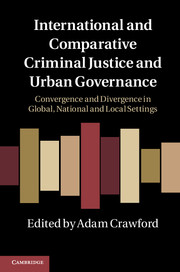 International and Comparative Criminal Justice and Urban Governance
International and Comparative Criminal Justice and Urban Governance Book contents
- Frontmatter
- Contents
- List of figures
- List of tables
- Notes on contributors
- Acknowledgements
- 1 International and comparative criminal justice and urban governance
- PART 1 International criminal justice
- 2 Unintended justice: the United Nations Security Council and international criminal governance
- 3 The International Criminal Court and the state of the American exception
- 4 Universal crimes, universal justice? The legitimacy of the international response to genocide, crimes against humanity and war crimes
- 5 Locating victim communities within global justice and governance
- 6 Dealing with war crimes in Bosnia: retributive and restorative options through the eyes of the population
- 7 Shaping penal policy from above? The role of the Grand Chamber of the European Court of Human Rights
- PART 2 Comparative penal policies
- PART 3 Comparative crime control and urban governance
- Index
- References
7 - Shaping penal policy from above? The role of the Grand Chamber of the European Court of Human Rights
from PART 1 - International criminal justice
Published online by Cambridge University Press: 05 June 2011
- Frontmatter
- Contents
- List of figures
- List of tables
- Notes on contributors
- Acknowledgements
- 1 International and comparative criminal justice and urban governance
- PART 1 International criminal justice
- 2 Unintended justice: the United Nations Security Council and international criminal governance
- 3 The International Criminal Court and the state of the American exception
- 4 Universal crimes, universal justice? The legitimacy of the international response to genocide, crimes against humanity and war crimes
- 5 Locating victim communities within global justice and governance
- 6 Dealing with war crimes in Bosnia: retributive and restorative options through the eyes of the population
- 7 Shaping penal policy from above? The role of the Grand Chamber of the European Court of Human Rights
- PART 2 Comparative penal policies
- PART 3 Comparative crime control and urban governance
- Index
- References
Summary
Since 2005 the Grand Chamber of the European Court of Human Rights (ECtHR) has given a series of ground-breaking judgments in which it has addressed the difficult question of the purpose of imprisonment while seeking to resolve complex practical issues, such as prisoners' rights to vote, artificial insemination by prisoners and the acceptability of whole life sentences. This chapter analyses some of these judgments closely. It points out that, while the judges often come to radical conclusions, they sometimes attempt to soften the blow by allowing states a margin of appreciation in instances where it is arguably inappropriate to do so. The chapter reflects on whether this is merely a short-term political strategy or whether this approach may undermine the considerable potential of the Grand Chamber to set a conceptual framework for prison law and policy applicable throughout Europe. It does so by considering the impact of these judgments on the penal reform process in England and Wales.
Introduction
It is the point of departure of this chapter – one that is regarded as obvious by human rights lawyers (who sometimes exaggerate its significance) – that courts applying general human rights standards can shape penal policy in crucial ways. Social scientists conversely, often do not pay sufficient attention to the subtleties of the judicial development of penal values, but they are more sensitive to the difference between the pronouncements of the courts and actual changes to penal policies and practices.
- Type
- Chapter
- Information
- International and Comparative Criminal Justice and Urban GovernanceConvergence and Divergence in Global, National and Local Settings, pp. 168 - 190Publisher: Cambridge University PressPrint publication year: 2011


